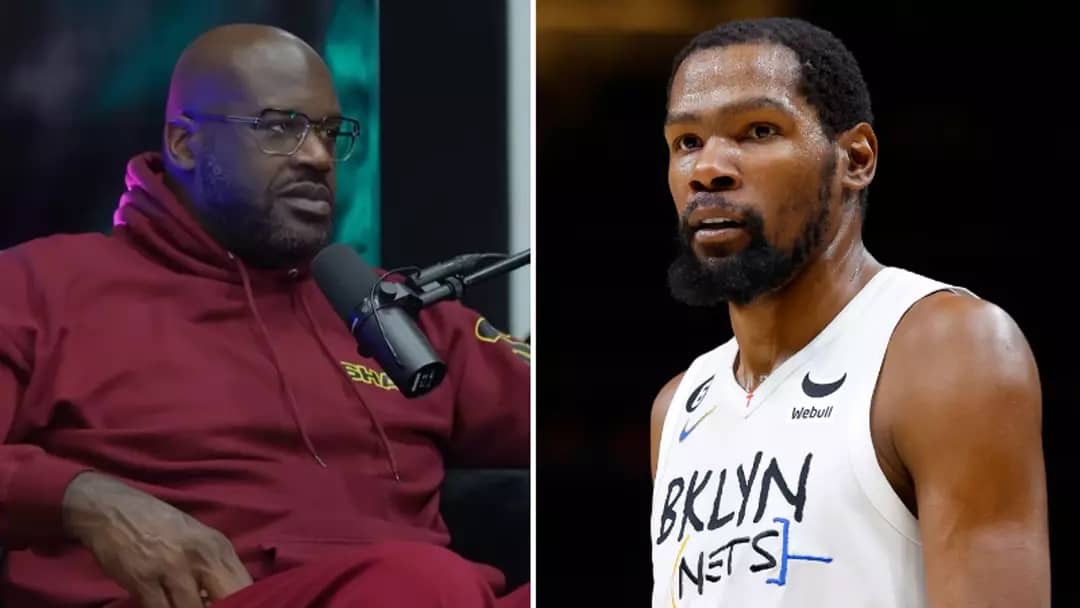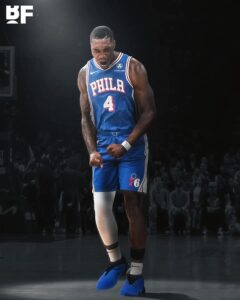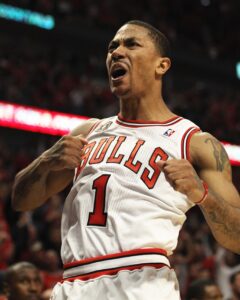
In the ever-polarizing discussion of basketball’s Greatest of All Time (GOAT), Shaquille O’Neal, one of the NBA’s all-time greats, recently ignited a fresh wave of controversy. When asked if Kevin Durant should be considered in the GOAT conversation alongside the legendary Michael Jordan, Shaq’s response was as fascinating as it was divisive.
Durant, known for his remarkable scoring ability and two NBA championships, has frequently been touted as one of the most talented players of his generation. However, Shaq, never one to shy away from bold opinions, gave a nuanced but sharp answer that raised eyebrows: “KD is great, but when you’re talking about the GOAT, that’s a different category altogether.
For Shaq, the GOAT debate is exclusive—reserved for those who have redefined the game in a way that transcends their individual stats. He explained that while Durant has undoubtedly achieved incredible success, the conversation about being on par with Michael Jordan is about more than just numbers. “MJ dominated his era like no other. He made winning look easy, and that’s what separates him,O’Neal added.
Fans were quick to respond, with some agreeing that Durant’s career, though remarkable, hasn’t reached the transformative heights of Jordan’s. Others, however, argue that Durant’s versatility, smooth shooting, and impact on the modern game warrant his inclusion in the GOAT debate.
Shaq’s comments have reignited the never-ending conversation about what it truly means to be considered the greatest. Is it pure dominance? Championships? Cultural impact? While Shaq clearly believes Durant is a notch below the Jordans and LeBrons of the world, the debate is far from over.
What’s your take—does Kevin Durant deserve to stand alongside Michael Jordan, or does Shaq have a point?
The GOAT (Greatest of All Time) debate in basketball has long been one of the most hotly contested discussions in sports, often centering on legendary figures like Michael Jordan, LeBron James, Kobe Bryant, and more recently, Kevin Durant. Shaquille O’Neal’s recent response to the question of whether Durant belongs in this elite category has added fuel to the fire, sparking widespread conversation across the NBA community.
Durant’s supporters argue that his incredible scoring ability, versatility, and two NBA championships (with the Golden State Warriors) make him a strong candidate for GOAT consideration. Standing at 7 feet tall, Durant is one of the most unique players in NBA history, able to shoot from anywhere on the court, handle the ball like a guard, and take over games in clutch moments. His career averages of nearly 30 points per game and multiple scoring titles highlight his dominance as an offensive force.
However, Shaq’s take highlights a deeper perspective on what it means to be considered the GOAT. According to O’Neal, while Durant’s individual talent is undeniable, there’s more to GOAT status than scoring or winning titles with a powerhouse team like the Warriors. For Shaq, the GOAT conversation is reserved for those who redefined the game and carried an unmatched level of influence both on and off the court.
Michael Jordan’s dominance in the ’90s, leading the Chicago Bulls to six championships in eight years, is often the measuring stick for greatness. Jordan not only won, but he did so as the clear leader of his team, often willing his squad to victory when the stakes were highest. His competitive fire, defensive prowess, and ability to perform in clutch moments defined an era of basketball. Shaq’s point seems to hinge on the idea that Jordan was not just a scorer or a great player—he was a game-changer, whose presence altered the entire landscape of the league.
For Shaq, being in the GOAT debate means leading a team to greatness rather than joining an already-established super team. This has been the most persistent criticism of Durant—after failing to secure a championship with the Oklahoma City Thunder, he joined the Warriors, a team that had already won a title and set an NBA-record 73 wins in a single season. While Durant was the Finals MVP during his tenure in Golden State, skeptics argue that his championships are somewhat diminished because he joined a team already destined for success.
O’Neal’s response also seems to tap into a larger cultural divide in the way fans view greatness. In Jordan’s era, the expectation was that the best players would build their teams, overcome adversity, and earn their titles by defeating the toughest opponents. In contrast, the modern NBA has seen the rise of “superteams,” where star players join forces to create juggernauts that dominate the league. Durant’s decision to join the Warriors is viewed by some as a departure from the traditional path to greatness, which is why many—including Shaq—are hesitant to place him in the same category as Jordan or even LeBron James, who led underdog Cleveland to a historic comeback championship in 2016.
The conversation about Durant’s place in the GOAT debate also opens up discussions about the criteria for greatness. Is it purely about rings and championships? Or is it about the way those titles are won, the adversity overcome, and the leadership displayed? For Shaq, it appears to be the latter, which is why, despite Durant’s undeniable talent, he isn’t ready to place him alongside Jordan just yet.
This debate is far from settled, and as Durant’s career continues, especially now as a member of the Phoenix Suns, he has more opportunities to add to his legacy. However, O’Neal’s comments serve as a reminder that in the minds of many basketball purists, greatness is about more than stats and talent—it’s about defining an era, and according to Shaq, Durant still has work to do before he can be mentioned in the same breath as Michael Jordan.






